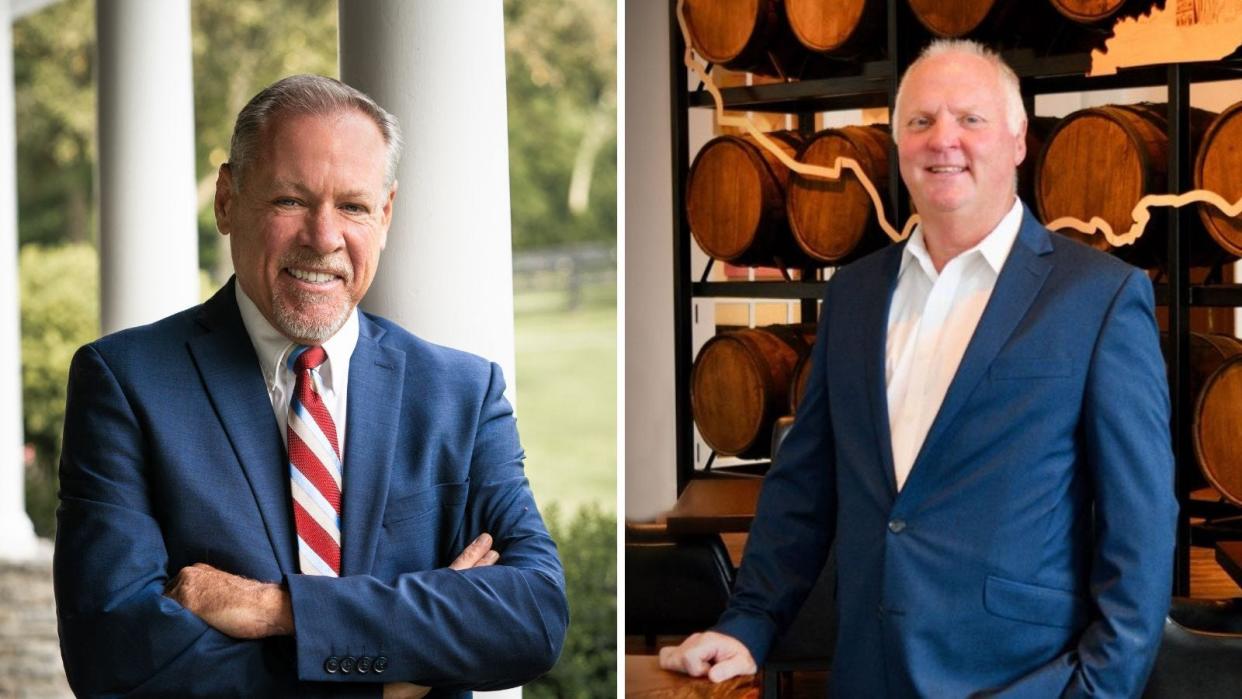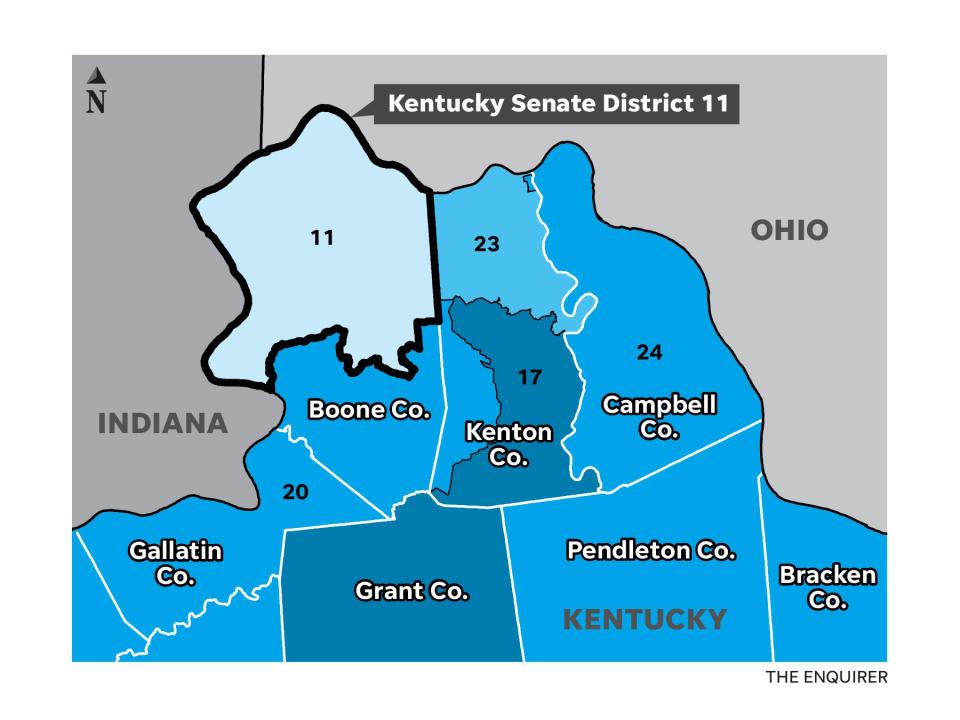District 11: Trump, immigration: Where these Boone Co. state senate candidates stand

- Oops!Something went wrong.Please try again later.
- Oops!Something went wrong.Please try again later.
- Oops!Something went wrong.Please try again later.
Northern Kentucky will see a power shift in Frankfort next session as two of its longtime state senators step down after decades in office.
Senate Majority Leader Damon Thayer, R-Georgetown, and Senator John Schickel, R-Union, announced last fall they would not run for re-election. With two of Northern Kentucky's five state senate seats up for grabs, Republicans are fighting for the chance to claim them.
Both districts, 11 and 17, are Republican strongholds.
In Boone County, Republican candidates Steve Rawlings and Duane Froelicher are running against each other for Schickel's District 11 seat. He's been state senator since 2009.

The Enquirer asked the GOP candidates where they stand on some of the most important issues to voters. Here's what the candidates had to say.
Note: There is no Democrat candidate in the District 11 Senate race.
Who's running?
Rawlings, 67, attended the Salmon P. Chase College of Law at Northern Kentucky University. He's a licensed attorney, though he's intentionally not practicing much while serving in the general assembly. He was a first-time candidate when he was elected Kentucky Representative in 2022.
Rawlings, of Burlington, is married and has two daughters and a granddaughter.
Froelicher, 60, attended Northern Kentucky University. He's the president of Walden Advisors, an investment strategies business. He served on the Florence city council for three terms and lost a mayoral bid in 2022.
Froelicher is married and has two sons, one of whom was gored by a bull during the 2019 running of the bulls in Pamplona.
How would you describe Jan. 6, 2021?
Froelicher: "I don't have an opinion on it. I've done a lot of research on it and I can't come to the conclusion of who's at fault here. Is it Trump? Is it the federal government? Is it the security that let people into the White House? Was there a conspiracy theory? Was there not a conspiracy theory? There's so much misinformation out there today."
Rawlings: "It's not at all what it appears to be about. For instance, President Trump, I think it was 10,000 troops he requested. It could have been a setup and so without knowing all the facts, it's difficult to put a label on what happened because they (those who hold positions of power) won't allow it."
"The federal government has overcharged people … they're putting people in lockup for such long periods of time. It's horrible what they're doing to ordinary citizens. It's terrible the way they've been treated."
Enquirer note: There is no evidence former President Donald Trump signed any order requesting thousands of National Guard troops be present Jan. 6, according to the Associated Press.
If former President Donald Trump is convicted of a crime, would you vote for him?
Froelicher: "Yes, I would vote for Donald Trump."
"The Georgia case is still pending and if you look at (District Attorney) Fani Willis, it looks like there's some impropriety there with her hiring her boyfriend as prosecuting attorney. So again, you're like, 'OK, what information is correct? What information is missing?'"
Rawlings: "I'd still vote for him. On the subject of law, you've heard that term lawfare? Instead of warfare it's the opposite party – in order to eliminate his main opposition – has sought though court actions to destroy his opponent and these things are unprecedented. All of these lawsuits were timed for the next election. That was their purpose."
Do any groups suffer from discrimination? What groups? What should done about it?
Froelicher: "I think we all do. But I think it's that person's, that individual person (who is being discriminated against) that needs to rise above that. You might be discriminated against, I might be discriminated against, but I think we need to rise above that."
Rawlings: "I think there's been discrimination across the board. Everybody has hardships in life, and everybody has to overcome. Everyone has to be an overcomer. So, I don't like to talk about division."
What if any changes would you make to the immigration system and pathways to citizenship?
Froelicher: "The immigration policy that we have here in the United States right now, it works. We allow roughly a million people into this country a year legally. So in terms of vetting process, yes, it's a little long and, yes, it does take a little time. However, to me, the system works. So as far as illegal immigration, I'm totally against it. We need to vet these people coming into the United States."
Rawlings: "We've already had pathways to citizenship and it was working well. So the thing is, legal immigrants are welcomed into the country and that's been working successfully. But the difference is illegal versus legal. Legal immigrants are very offended and so upset, the ones I've heard from, that this is happening now that they've had to go through a process that may be costing up to $10,000 ... and then they watch these people cross the border and get benefits ... and be provided for when they have fought and they've really did things the right way and took the legal route."
What if any role should the government play in healthcare decisions?
Froelicher: "The problem is, we now have socialized medicine. So now the federal government is dictating what's paid and what services they can get. So I firmly believe that it's your individual rights. You want to take the vaccine, if you don't want to take the vaccine – it's your choice"
Rawlings: "I don't think that government should be involved in health decisions."
"I filed bills each session on medical freedom – bills that we should never have to take medical treatment against our will, whether it be a shot, or pill or medical treatment of any kind. That should never happen."
Where do you stand on the issue of abortion? Gun rights?
Froelicher: "I'm 100% pro life. Priority one is taking care of the (life of the) mother."
On exceptions for rape and incest: "You're still killing a baby (if you have an abortion.) I met a woman the other day, and she said, 'My mother was raped when she was 14 and the baby was given up for adoption. That baby was me,' and I got to meet her three kids. That's why I'm 100%."
"We have so many … restrictions now on owning a gun, as far as the waiting period, all the background checks. I don't think we really need to add any more to that."
Rawlings: "Biblically, our father knew us before we were formed in our mother's wombs. Rape and incest are terrible, terrible situations and criminal. But I don't want to burden that young girl with killing her own baby. Two crimes don't make it right. "
"I'm very much a Second Amendment rights (supporter) – that our rights to bear arms shall not be infringed. So, I don't believe in the (current gun) restrictions."
This article originally appeared on Cincinnati Enquirer: Q&A: Boone County state senate candidates talk abortion, immigration

